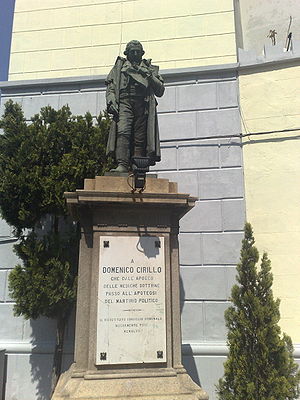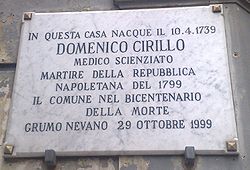- Domenico Cirillo
-
Domenico Cirillo (Grumo Nevano, April 10, 1739 – Naples, October 9, 1799), Italian physician and patriot, was born at Grumo Nevano in the kingdom of Naples.
 Statue of Domenico Cirillo in Grumo Nevano
Statue of Domenico Cirillo in Grumo Nevano
Appointed while yet a young man to a botanical professorship, Cirillo went some years afterwards to England, where he was elected fellow of the Royal Society, and to France. On his return to Naples he was appointed successively to the chairs of practical and theoretical medicine. He wrote voluminously and well on scientific subjects and secured an extensive medical practice.
On the French occupation of Naples and the proclamation of the Parthenopean Republic (1799), Cirillo, after at first refusing to take part in the new government, consented to be chosen a representative of the people and became a member of the legislative commission, of which he was eventually elected president. On the abandonment of the republic by the French (June 1799), Cardinal Ruffo and the army of Ferdinand IV returned to Naples, and the republicans withdrew, ill-armed and inadequately provisioned, to the forts. After a short siege they surrendered on honorable terms, life and liberty being guaranteed them by the signatures of Ruffo, of Foote, and of Micheroux. But the arrival of Lord Nelson changed the complexion of affairs, and he refused to ratify the capitulation. Secure under the British flag, Ferdinand and his wife, Marie Caroline of Austria, showed themselves eager for revenge, and Cirillo was involved with the other republicans in the vengeance of the royal family. He asked Lady Hamilton (wife of the British ambassador to Naples) to intercede on his behalf, but Nelson wrote in reference to the petition: "Domenico Cirillo, who had been the king's physician, might have been saved, but that he chose to play the fool and lie, denying that he had ever made any speeches against the government, and saying that he only took care of the poor in the hospitals" (Nelson and the Neapolitan Jacobins, Navy Records Society, 1903). He was condemned and hanged on 29 October 1799. Cirillo, whose favorite study was botany, and who was recognized as an entomologist by Carolus Linnaeus, left many books, in Latin and Italian, all of them treating of medical and scientific subjects. The Virile morali dell'Asino is a pleasant philosophical pamphlet remarkable for its double charm of sense and style. He introduced many medical innovations into Naples, particularly inoculation for smallpox.
 Commemorative plaque to Domenico Cirillo on building where he was born in Grumo Nevano
Commemorative plaque to Domenico Cirillo on building where he was born in Grumo Nevano
Cirillo wrote Ad botanicas institutiones introduction Naples, 1771, De essentialibus nonnullarum plantarum characteribus 1784, Plantarum rariorum regni Neapolitani fasciculus 1788-1793, Entomologiae neapolitanae specimen primum Naples 1787-1792) and several works on hygiene.
Today Grumo Nevano, his hometown, had dedicated a school (now Institute Comprehensive Matteotti-Cirillo), a statue in the central square of the town, just to be named after him, one of the country's main course and a Library "Biblioteca Comunale Domenico Cirillo". To Cirillo was also named the national boarding school in Bari and the High School of Aversa in the province of Caserta.
See C. Giglioli, Naples in 1799 (London, 1903); L. Conforti, Napoli nel 1799 (Naples, 1889); C. Tivaroni, L'Italia durante il dominio francese, vol. ii, pp. 179-204.
References
 This article incorporates text from a publication now in the public domain: Chisholm, Hugh, ed (1911). Encyclopædia Britannica (11th ed.). Cambridge University Press.
This article incorporates text from a publication now in the public domain: Chisholm, Hugh, ed (1911). Encyclopædia Britannica (11th ed.). Cambridge University Press.
External links
Categories:- Botanists with author abbreviations
- 1739 births
- 1799 deaths
- People from the Province of Naples
- People executed by hanging
- Italian entomologists
- Executed Italian people
- People executed by the Kingdom of Naples
- 18th-century executions
Wikimedia Foundation. 2010.
